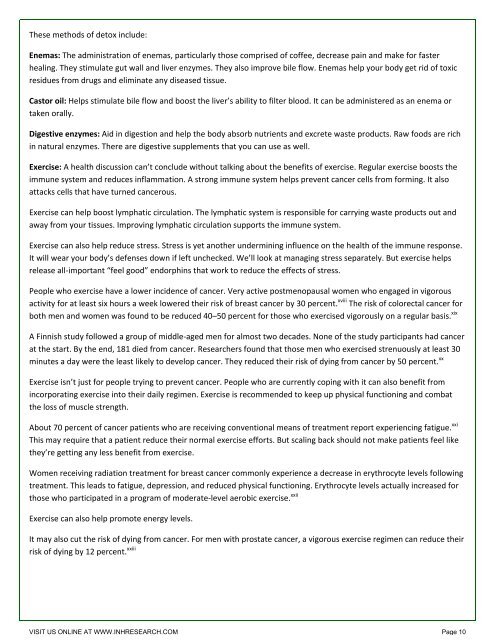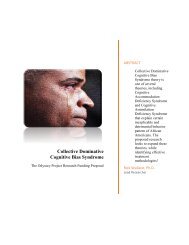Cut Your Cancer Risk in Half:
You also want an ePaper? Increase the reach of your titles
YUMPU automatically turns print PDFs into web optimized ePapers that Google loves.
These methods of detox <strong>in</strong>clude:<br />
Enemas: The adm<strong>in</strong>istration of enemas, particularly those comprised of coffee, decrease pa<strong>in</strong> and make for faster<br />
heal<strong>in</strong>g. They stimulate gut wall and liver enzymes. They also improve bile flow. Enemas help your body get rid of toxic<br />
residues from drugs and elim<strong>in</strong>ate any diseased tissue.<br />
Castor oil: Helps stimulate bile flow and boost the liver’s ability to filter blood. It can be adm<strong>in</strong>istered as an enema or<br />
taken orally.<br />
Digestive enzymes: Aid <strong>in</strong> digestion and help the body absorb nutrients and excrete waste products. Raw foods are rich<br />
<strong>in</strong> natural enzymes. There are digestive supplements that you can use as well.<br />
Exercise: A health discussion can’t conclude without talk<strong>in</strong>g about the benefits of exercise. Regular exercise boosts the<br />
immune system and reduces <strong>in</strong>flammation. A strong immune system helps prevent cancer cells from form<strong>in</strong>g. It also<br />
attacks cells that have turned cancerous.<br />
Exercise can help boost lymphatic circulation. The lymphatic system is responsible for carry<strong>in</strong>g waste products out and<br />
away from your tissues. Improv<strong>in</strong>g lymphatic circulation supports the immune system.<br />
Exercise can also help reduce stress. Stress is yet another underm<strong>in</strong><strong>in</strong>g <strong>in</strong>fluence on the health of the immune response.<br />
It will wear your body’s defenses down if left unchecked. We’ll look at manag<strong>in</strong>g stress separately. But exercise helps<br />
release all‐important “feel good” endorph<strong>in</strong>s that work to reduce the effects of stress.<br />
People who exercise have a lower <strong>in</strong>cidence of cancer. Very active postmenopausal women who engaged <strong>in</strong> vigorous<br />
activity for at least six hours a week lowered their risk of breast cancer by 30 percent. xviii The risk of colorectal cancer for<br />
both men and women was found to be reduced 40–50 percent for those who exercised vigorously on a regular basis. xix<br />
A F<strong>in</strong>nish study followed a group of middle‐aged men for almost two decades. None of the study participants had cancer<br />
at the start. By the end, 181 died from cancer. Researchers found that those men who exercised strenuously at least 30<br />
m<strong>in</strong>utes a day were the least likely to develop cancer. They reduced their risk of dy<strong>in</strong>g from cancer by 50 percent. xx<br />
Exercise isn’t just for people try<strong>in</strong>g to prevent cancer. People who are currently cop<strong>in</strong>g with it can also benefit from<br />
<strong>in</strong>corporat<strong>in</strong>g exercise <strong>in</strong>to their daily regimen. Exercise is recommended to keep up physical function<strong>in</strong>g and combat<br />
the loss of muscle strength.<br />
About 70 percent of cancer patients who are receiv<strong>in</strong>g conventional means of treatment report experienc<strong>in</strong>g fatigue. xxi<br />
This may require that a patient reduce their normal exercise efforts. But scal<strong>in</strong>g back should not make patients feel like<br />
they’re gett<strong>in</strong>g any less benefit from exercise.<br />
Women receiv<strong>in</strong>g radiation treatment for breast cancer commonly experience a decrease <strong>in</strong> erythrocyte levels follow<strong>in</strong>g<br />
treatment. This leads to fatigue, depression, and reduced physical function<strong>in</strong>g. Erythrocyte levels actually <strong>in</strong>creased for<br />
those who participated <strong>in</strong> a program of moderate‐level aerobic exercise. xxii<br />
Exercise can also help promote energy levels.<br />
It may also cut the risk of dy<strong>in</strong>g from cancer. For men with prostate cancer, a vigorous exercise regimen can reduce their<br />
risk of dy<strong>in</strong>g by 12 percent. xxiii<br />
VISIT US ONLINE AT WWW.INHRESEARCH.COM Page 10


















